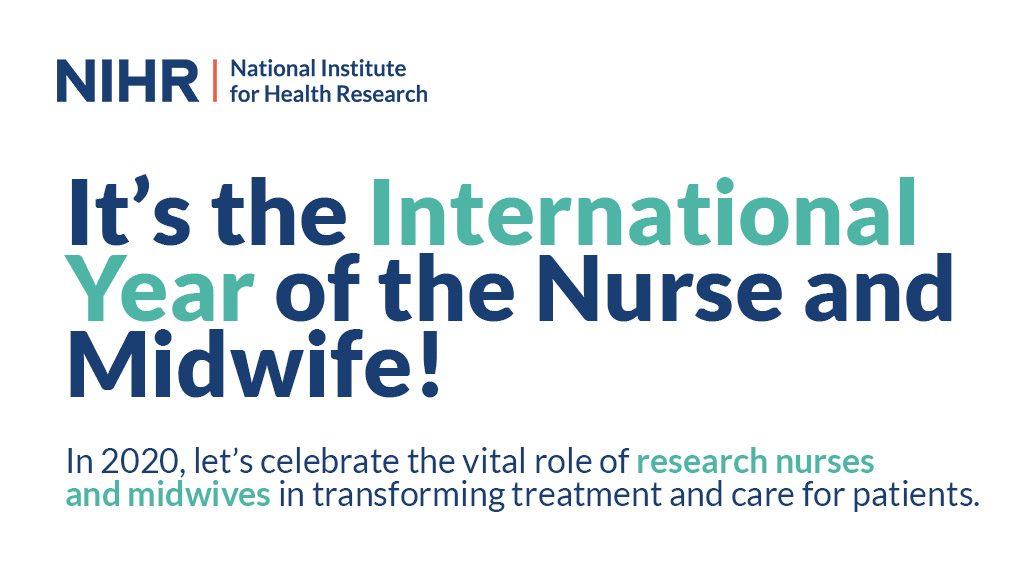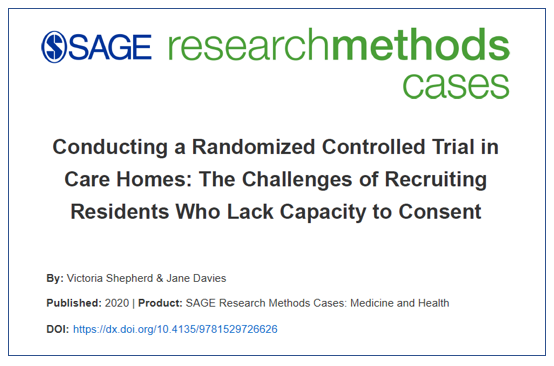International Year Of The Nurse And Midwife 2020 – Celebrating Nurses And Midwives’ Roles In The Work Of The Centre For Trials Research
29 January 2020
The World Health Organization has dedicated 2020 to nurses and midwives to create a ‘once in a generation opportunity’ to showcase the critical role that the nursing and midwifery professions play in supporting global health.
It chose the theme to coincide with the 200th anniversary of the birth of Florence Nightingale. While Nightingale is known as the ‘lady with the lamp’ for her work during the Crimean War, she is less well known for her pioneering statistical work with hospital and post-partum mortality data which lead to landmark public health reforms. Her calls in the 1890’s for better use of routinely collected data, and frustration with policy-makers’ failure to use it in decision making, will resonate with today’s researchers.
Nurses and midwives’ role in research delivery
As the largest group of health care professionals, nurses and midwives play a vital role in research delivery. The NIHR are joining the celebrations, and see this year as being an opportunity to celebrate the important work of nurses and midwives in research and highlight the huge contribution that nurses and midwives play in improving health and care services across a range of health and social care settings.
Nurses and midwives (and other health and care professionals) play a vital role in the work of the Centre for Trials Research. Many of the clinical trials and complex studies that we lead rely on highly skilled research nurses and midwives, as well as nursing and midwifery colleagues providing care for patients and members of the public, to successfully deliver them. Their skills and experience are vital to ensure the delivery of high-quality and safe participant-centred research across different clinical areas and care settings.

Working collaboratively and in partnership with nurses and midwives
Many of our trials are delivered in partnership with, and supported by, research nurses and midwives from other organisations such as health boards and Health and Care Research Wales Research Delivery Staff in Wales, and by the NIHR Clinical Research Networks in England. This includes our work in primary and secondary care, and trials led by the Centre’s cancer division.
Some of our trials involve complex nurse-led clinical procedures such as PRIMUS which aims to create a clinical decision support tool to help GPs with the management of lower urinary tract symptoms in men. Others involve novel therapies for neurodegenerative conditions such as Huntington’s disease (TRIDENT). These trials also benefit from the Centre’s research nurses who play a key role in managing and supporting these complex and potentially challenging trials. We also contribute to work that aims to improve care delivery, such as exploring person-centred care in care homes, and evaluating interventions which aim to improve people’s health and wellbeing such as social prescribing.
Midwives also play an important role in a number of the Centre’s trials, including a current trial to evaluate the safety of waterbirths (POOL) which is led by Professor Julia Sanders who is a Consultant Midwife and Professor of Clinical Nursing and Midwifery at Cardiff University and a long-term collaborator with the Centre.
Nurses as core members of the Centre’s academic staff
Unusually for a Clinical Trials Unit, we have nurses as members of the Centre for Trials Research academic staff. This means that we have been able to support trials that require significant and/or specialised research nurse support, such as PRIMUS and TRIDENT and our recently completed PRINCESS trial of a probiotic in care homes. This was a randomised controlled trial which could be considered challenging to deliver in a non-NHS setting with older frail people, 70% of who have cognitive impairment affecting their ability to provide informed consent. Having Research Associates who are nurses meant that we could design the trial to be feasible to deliver in close partnership with care homes, and design and deliver training to research nurses from other networks/organisations who were supporting the trial in other locations. We have also shared the lessons we learnt more widely, recently publishing it as a Research Methods Case.

Moving from delivering research to developing researchers
Non-medical health professionals are increasingly at the forefront of world-leading research, and the Centre supports a number of nurses and midwives developing their research careers. This is both through the Research Design and Conduct Service (RDCS SE Wales) we host which supports health and social care professionals to develop high quality applications for funding, and supporting the career development of our research staff and collaborators who are nurses and midwives through funding applications, publications, conference presentations etc.
I have benefited from the Centre’s support to develop my programme of research into the ethical, legal, and practical issues encountered when involving adults who lack capacity to consent in research, which was recently recognised at the Wales Nurse of the Year Awards.

The findings from this novel area of research has in turn enabled me to support the trials we conduct which include populations who may have impaired capacity to consent, including PRINCESS and others being conducted in emergency settings.
A call to action!
However, a recent report from the Council of Deans identified the challenges of recruiting and retaining an academic nursing, midwifery and allied health workforce. They expressed concerns about the lack of academic career pathways in healthcare disciplines, and the importance of increasing research capacity. The NIHR has also identified the need to strengthen the research voice and influence of nurses and midwives in health and social care settings.
The International Year of the Nurse and Midwife provides a golden opportunity to highlight the important contribution from nurses and midwives towards delivering and leading research in the Centre for Trials Research and beyond. Through this, we can showcase the range of research that nurses and midwives undertake and lead, and their role in improving the health and wellbeing of all in society.
- April 2024
- March 2024
- December 2023
- November 2023
- September 2023
- July 2023
- June 2023
- April 2023
- March 2023
- February 2023
- December 2022
- November 2022
- October 2022
- September 2022
- August 2022
- July 2022
- June 2022
- May 2022
- April 2022
- March 2022
- February 2022
- January 2022
- November 2021
- September 2021
- July 2021
- June 2021
- May 2021
- March 2021
- February 2021
- December 2020
- November 2020
- September 2020
- August 2020
- July 2020
- January 2020
- December 2019
- October 2019
- September 2019
- July 2019
- June 2019
- May 2019
- April 2019
- February 2019
- December 2018
- November 2018
- October 2018
- September 2018
- August 2018
- July 2018
- June 2018
- May 2018
- April 2018
- March 2018
- December 2017
- October 2017
- August 2017
- July 2017
- June 2017
- May 2017
- April 2017
- March 2017
- February 2017
- January 2017
- December 2016
- October 2016
- August 2016
- June 2016
- April 2016
- March 2016
- February 2016